
Cognitive, Affective, and Personality Traits
Emotional Intelligence, FD/FI Cognitive Styles and Motivation: Impact on EFL/ESL Learners' Vocabulary Breadth
Versandkostenfrei!
Versandfertig in 6-10 Tagen
36,99 €
inkl. MwSt.

PAYBACK Punkte
18 °P sammeln!
The most influential variables in the process of language learning are related to learners' emotions, attitudes, and personality. Since learners' cognitive, affective, and personality traits may affect how they receive, perceive, and store vocabulary items in English, investigating such traits to know how they are related to the composite and breadth of learners' vocabulary would be very useful in dealing with teaching vocabulary in a foreign language. Thus, language teachers can take personal factors into a more serious consideration in their students' language learning process; hence, this b...
The most influential variables in the process of language learning are related to learners' emotions, attitudes, and personality. Since learners' cognitive, affective, and personality traits may affect how they receive, perceive, and store vocabulary items in English, investigating such traits to know how they are related to the composite and breadth of learners' vocabulary would be very useful in dealing with teaching vocabulary in a foreign language. Thus, language teachers can take personal factors into a more serious consideration in their students' language learning process; hence, this book contains details of a study that investigated the possible relationship between emotional intelligence, field dependence/ independence cognitive styles, motivation, and vocabulary breadth among learners of English as a Foreign/Second Language.












